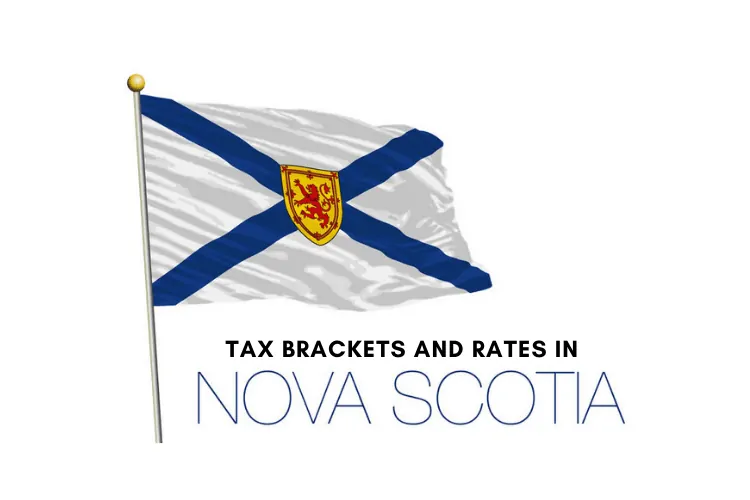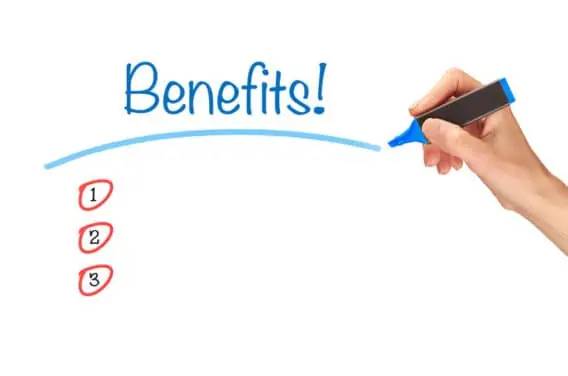Like its neighbouring Atlantic provinces (New Brunswick, Prince Edward Island, and Newfoundland and Labrador), Nova Scotians pay one of the highest personal income tax rates in the country.
The lowest tax rate in Nova Scotia for the 2022 tax year is 8.79% and applies to income up to $29,590. On the other end of the spectrum, you pay 21% on taxable income exceeding $150,000.
The province does not index its tax brackets to the annual inflation rate or Consumer Price Index (CPI).
When combined with federal taxes, residents of Nova Scotia pay combined federal-provincial tax rates ranging from 15% to 54%.
As of this writing, the minimum wage in Nova Scotia is $12.95 per hour.
You can learn about the tax rates and brackets in other provinces below:
Nova Scotia Tax Brackets 2022
The income tax rates and tax brackets in Nova Scotia for the 2022 tax year are:
| 2022 Taxable Income | Nova Scotia Tax Rate 2022 |
|---|---|
| Up to $29,590 | 8.79% |
| $29,590.01 to $59,180 | 14.95% |
| $59,180.01 to $93,000 | 16.67% |
| $93,000.01 to $150,000 | 17.50% |
| $150,000.01 and over | 21.00% |
Since Nova Scotia does not index its tax brackets to inflation, the tax brackets and rates stay the same for the 2022 tax year.
Below is how these numbers affect your paycheque. You pay:
- 8.79% on the first $29,590 of taxable income, plus
- 14.95% on the next $29,590 (i.e. on the portion of taxable income over $29,590 up to $59,180), plus
- 16.67% on the next $33,820 (i.e. on the portion of taxable income over $59,180 up to $93,000) plus,
- 17.50% on the next $57,000 (i.e. on the portion of taxable income over $93,000 up to $150,000 plus,
- 21% on amounts exceeding $150,000
Nova Scotia’s regular basic personal amount is $8,481.
Tax filers who earn a taxable income of less than $25,000 enjoy an increase of the provincial basic personal amount by $3,000 from $8,481 to $11,481.
A 6% phase-off rate applies to this increase and it is reduced to $0 when your taxable income reaches $75,000.
For your Federal return, the basic personal amount is up to $14,398 in 2022.
What this means is that you won’t owe federal taxes if your taxable income is $14,398 or lower. This same idea applies to the provincial basic personal amount and provincial taxes payable.
Related: Canada’s Tax Rates and Tax Brackets.
Nova Scotia Marginal Tax Rates (Federal and Provincial)
The federal income tax rates applicable across Canada in 2022 are:
| Taxable Income | Federal Tax Rate |
| Up to $50,197 | 15% |
| $50,197.01 to $100,392 | 20.50% |
| $100,392.01 to $155,625 | 26% |
| $155,625.01 to $221,708 | 29% |
| $221,708.01 and over | 33% |
Your combined provincial and federal marginal tax rate is the rate at which you pay taxes on every additional dollar of income.
For the 2022 tax year, the combined marginal tax rates in Nova Scotia are:
| Taxable Income | Regular Income | Capital Gains | Ineligible Canadian Dividends | Eligible Canadian Dividends |
| Up to $25,000 | 23.79% | 11.90% | -0.11% | 13.54% |
| $25,001 to $29,590 | 24.32% | 12.16% | 0.62% | 14.15% |
| $29,591 to $48,535 | 30.48% | 15.24% | 9.12% | 21.23% |
| $48,536 to $59,180 | 35.98% | 17.99% | 16.71% | 27.56% |
| $59,181 to $75,000 | 37.70% | 18.85% | 19.09% | 29.54% |
| $75,001 to $93,000 | 37.17% | 18.59% | 18.35% | 28.93% |
| $93,001 to $97,069 | 38.00% | 19.00% | 19.50% | 29.88% |
| $97,070 to $150,000 | 43.50% | 21.75% | 27.09% | 36.21% |
| $150,001 to $150,473 | 47.00% | 23.50% | 31.92% | 40.23% |
| $150,474 to $214,368 | 50.38% | 25.19% | 36.59% | 44.12% |
| $214,369 and over | 54.00% | 27.00% | 41.58% | 48.28% |
Related: Best Tax Software in Canada.
As shown above, the highest marginal tax rates payable in Nova Scotia for different types of income are:
- Regular income: 54%
- Capital gains: 27%
- Ineligible Canadian dividends: 48.28%
- Eligible Canadian dividends: 41.58%

Nova Scotia Tax Credits and Deductions
Tax credits and deductions lower the taxes you need to pay on provincial and federal levels.
Common Federal non-refundable tax credits you can claim include:
- Basic personal amount
- Age amount
- Spouse or common-law partner amount
- Canada caregiver amount
- CPP contributions
- Employment insurance premiums
- Charitable donations
- EI premiums
- Pension Income Amount
- Medical expenses
- Tuition, education, and textbook amounts
Non-refundable tax credits only reduce the tax you owe. If you are eligible for non-refundable tax credits and have no taxes owing, you don’t get a refund.
Common Federal refundable tax credits you may be eligible for include:
- Goods and services credit (or HST)
- Working Income Tax Credit
Tax credits specific to Nova Scotia include the:
- Volunteer firefighters and Ground Search & Rescue Tax Credit
- Affordable Living Tax Credit
- Poverty Reduction Credit
Nova Scotia Sales Tax
The Harmonized Sales Tax (HST) in Nova Scotia is 15%. The provincial portion is 10% while 5% goes to the federal government.
The HST rate is also 15% in New Brunswick, Newfoundland and Labrador, and Prince Edward Island.
There are HST tax credits and rebates on some purchases including diapers, books, feminine hygiene products, and children’s clothing and footwear.
How To File Your Tax Return in Nova Scotia
Depending on your financial situation or preference, you can file your income tax and benefit return using free tax software such as WealthsimpleTax and TurboTax.
Wealthsimple Tax is 100% free and includes a 100% accuracy guarantee as well as refund maximization.
TurboTax also offers a paid service if you have a complex return or need expert assistance. Learn more about what each program offers in this WealthsimpleTax review and TurboTax review.
Low or modest-income Canadians may be eligible to file their taxes using the automated File My Return Service or free tax clinic organized by the CRA.



